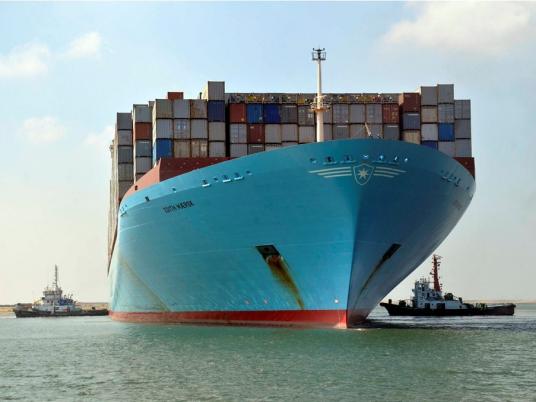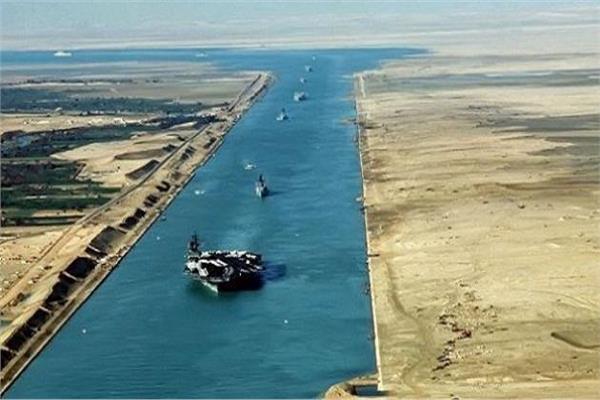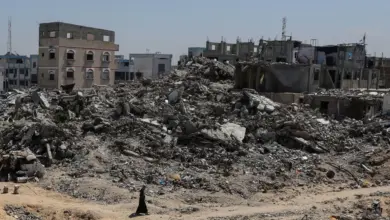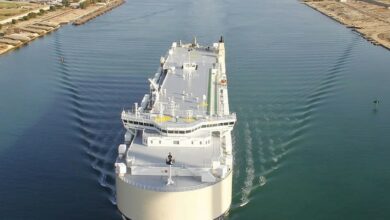
As Egypt struggles to emerge from a period of deep financial uncertainty, government officials are looking towards the country’s vital shipping artery — the Suez Canal — as a major source of revenue and jobs. Officials from several ministries have announced a suite of massive public-private partnerships aimed at developing the region.
The hope, they say, is that this waterway connecting Asia’s economies to those of the Western hemisphere could evolve into a high-tech logistical hub, with a thriving commercial and urban center growing out of the surrounding barren landscape.
Since the 1990s, the government has been implementing an ambitious plan for financial and economic reform in the Suez Canal region. Under former President Hosni Mubarak, this largely meant enhancing investment incentives to attract Arab and foreign investors. But, despite almost two decades and billions of pounds invested in infrastructure east of Port Said and the northwest Suez Gulf economic and industrial zone, residents in the area have seen little real progress.
Approved plan
Earlier this month, the ministries of housing, industry, investment and transport met to discuss the development of what they call the “Suez Canal Axis,” several parcels of land in and around the desert passageway.
“As part of the project, 77,000 acres east of Suez Canal will be reclaimed, in addition to establishing fisheries across the governorates of Suez and Port Said”, said Mostafa Madbouly, head of the General Organization for Physical Planning (GOPP), in a statement following the meeting.
The project will target three areas: the area east of Port Said, Ismailia; the Amal district and Technology Valley; and the northwest Gulf of Suez along with the port and airport of Ain Sokhna. Ministers said the projects should transform the Suez Canal axis by 2027. Projects include the establishment of a technology university in the Technology Valley in Ismailia, a scientific city in cooperation with international universities, and a medical city in eastern Port Said city.
Minister of Housing Tareq Wafiq, who also attended the meeting, told the state news agency MENA that, if the projects are completed, they could create about one million jobs in the coming decade.
The government also seems to be giving the projects significant financial priority. At the same meeting, Minister of Investment Osama Saleh announced that his ministry would be responsible for obtaining the necessary funding for the project. The development push also seems to be motivated by recently signed international trade agreements. Ministry of Industry and Foreign Trade Hatem Saleh, also present, said the ministry intends to establish industrial complexes and central ports to boost exports and trade and contribute to economic growth.
Foreign ownership?
It was under French leader Napoleon Bonaparte’s orders that workers first broke the ground in the Sinai that would become the modern canal. After that, the canal was held by the French, the British, and joint-owned Egyptian and British companies. Though the first ship passed through the canal in 1869, the waterway did not come into Egyptian hands until 1956, when Nasser nationalized it and nearly started a war between France, Britain, Egypt and the US.
Throughout the past year and a half’s political transition, fears of foreign influence have surfaced again. The main fear is that Qatar’s financial assistance is designed to gain control over the canal. The Gulf state’s relationship with the Muslim Brotherhood, from which President Mohamed Morsy hails, has come under scrutiny, with some claiming Morsy’s campaign was funded by Qatar. The most outrageous rumors suggest the Muslim Brotherhood group is planning to rent the Suez Canal to Qatar for 99 years.
The Brotherhood’s leadership has strongly denied these accusations. Presidential spokesperson Yasser Ali called rumors of selling the canal “absurd and illogical.”
Whatever the truth to the rumors, it does seem like Egypt is giving Qatar a significant role in the Suez Canal development scheme. Qatar has been keen to offer financial support to Egypt since Mubarak left office last January. Earlier this month, Qatar also confirmed it would invest US$18 billion dollars in tourism and industry projects along Egypt’s Mediterranean coast over the next five years. Among them are $8 billion for gas, power and iron and steel plants east of Port Said and $10 billion for a giant tourist resort on the Mediterranean coast.
Good intentions
It remains to be seen how the government’s plans and Qatar’s dollars will be translated into jobs and improved infrastructure for the residents of Port Said and the Suez region. Mohamed Youssef, president of the Holding Company for Land and Maritime Transportation, one of the companies planning on investing in the project, said he expects the changes to have concrete results for the Egyptian economy.
He pointed to the International Monetary Fund’s description of development plans for the region as the “engine of national economic development in the area,” tightly linking it to the future prosperity of Egypt’s economy. Youssef told Egypt Independent that the project will not be like those under Mubarak, which favored foreign companies over those owned by Egyptians. He hopes his company will obtain the contract to develop the third containers terminal at the eastern part of Port Said.
Its current projects include an LE3 billion project at the western port terminal in Port Said, and similar port construction projects in Dekhelia and Damietta.
Abdul Mageed Matar, maritime transportation expert and former member of the Red Sea Chamber of Shipping, agreed that developing the Suez Canal Axis is of paramount national importance.
“If there is goodwill,” he said, “on the part of Egyptian officials, the strategy could be truly beneficial.”
He sees many more public and private sectors partnerships in the future. Due to the large budget deficit, he said the government will not be able to finance any projects from its own pockets exclusively. However, he had reservations about the government being able to attract foreign investment.
The lack of security is a major obstacle to attracting investment, whether local or foreign, he said, and the current plans ignore the lawlessness in Sinai.
Reda Issa, researcher and socioeconomic expert, said that a project of such magnitude needs to be researched thoroughly before it is implemented. It should also be subjected to extensive societal dialogue, he said.
“No group of people should be individually or exclusively able to take it into their hands to start such a national project,” he said. “After the revolution, we are entitled to know what exactly is going to happen and how, especially given that most economic laws are still the same and no one has tried to address them or change them in any way.”
Being a state security and strategic matter, Issa said that if Egypt is to give any entity a concession in the area now, the people and an elected parliament must approve it first. He added that before talking about attracting investments to the region, the government should agree on fair investments laws and labor rights, in order to create a fair business environment and healthy relationships between workers and investors.
This article was originally published in Egypt Independent's weekly print edition.




